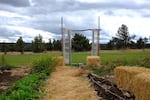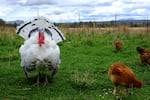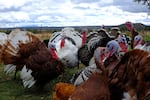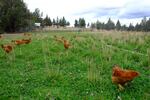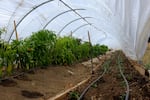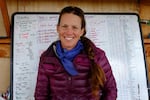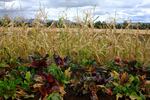
Rainshadow Organics, a farm in Central Oregon, grows all manner of organic vegetables, and raises chickens, turkeys and pigs.
Sage Van Wing / OPB
Sarahlee Lawrence has lived and traveled all over the world, but the place she feels most at home is the patch of high desert scrub land she grew up on just outside of Bend in Central Oregon. Lawrence came back to her family ranch and transformed the arid land into a lush organic farm with the help of irrigation and a rotating cast of volunteers. This year she's participating in a new program which helps train young people to become farmers through on-the-farm internships.
"I have a masters in environmental education, but I don't really do that now (that) I've started farming," Lawrence said, "so (this) seemed like a really wonderful way to incorporate that into my life and to be able to share the few things that I know and to make discoveries with people as well."
The farm, Rainshadow Organics, grows all manner of organic vegetables, along with chickens, turkeys and pigs. Most of the farms around the area grow more conventional crops, but Lawrence said even during a drought year her farm was able to irrigate the crops with less than the full allotment of water they have available.
"At this farm, they've done a lot of work to make their irrigation more efficient," said one of the farm's interns, Richard Gelbe. "They've installed miles of drip irrigation which is hugely impressive."
The interns live on the farm from May to November in tents on raised platforms. They work long days, and learn how to deal with everything from the weather to how to balance the books and sell crops at farmers markets.
"We learn how to grow vegetables and everything," said Melissa Wells, another one of the interns. "But I think we learn a lot of perseverance too."
"I'm learning that farming is one of the most multifaceted and difficult jobs that you can have, Gelbe said. "There's just so much you're managing: between marketing, and organizing your staff, and keeping things alive, and planting dates. Getting the misconception that farming is easy out of my head is what I'm learning."
Sarah Wells, another of the interns, said that in some ways learning how to grow vegetables is actually the least challenging of the skills they are absorbing this season.
"You can read about growing things and learn the science behind it if you want to, but there's so many pieces to ... actually getting the food to market ... the work is never over," Wells said.
Lawrence agrees, saying that one of the most important things she teaches is the business side of farming.
"Everybody needs to make money," said Lawrence, "and learning how to do that on a farm is really challenging because it is a lot of work and when you really try to track your hours and your inputs, it's really hard to make things pencil out."
Though not every intern who completes the Rogue Farm Corps program will eventually become a farmer, all the interns told Think Out Loud that they were committed to growing their own food at the very least.
"Where these people land and where there land is, and what they end up farming, is going to be specific to them," Lawrence said. "But hopefully they'll be able to take what they learn here and try to extrapolate that to whatever they chose to do."

